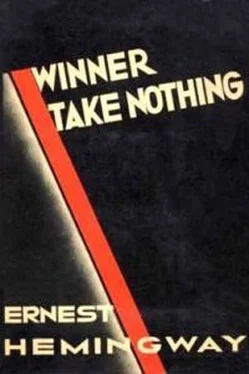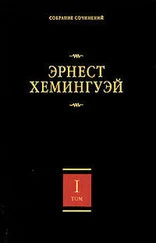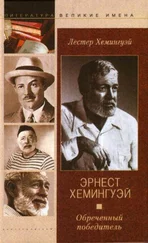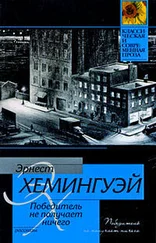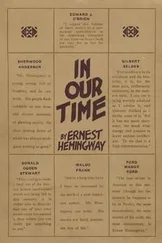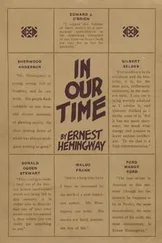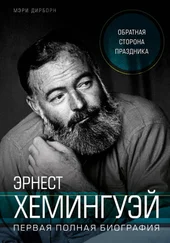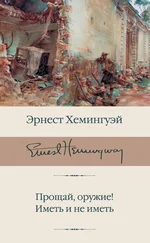“It’s good,” I said. “It and wine too.”
“You’re like Fontan. But there was a thing here that I never saw. I don’t think you’ve ever seen it either. There were Americans came here and they put whiskey in the beer.”
“No,” I said.
“Oui. My God, yes, that’s true. Et aussi une femme qui a vomis sur la table!”
“Comment?”
“C’est vrai. Elle a vomis sur la table. Et après elle a vomis dans ses shoes. And afterward they come back and say they want to come again and have another party the next Saturday, and I say no, my God, no! When they came I locked the door.”
“They’re bad when they’re drunk.”
“In the winter–time when the boys go to the dance they come in the cars and wait outside and say to Fontan, ‘Hey, Sam, sell us a bottle wine,’ or they buy the beer, and then they take the moonshine out of their pockets in a bottle and pour it in the beer and drink it. My God, that’s the first time I ever saw that in my life. They put whiskey in the beer. My God, I don’t understand that !”
“They want to get sick, so they’ll know they’re drunk.”
“One time a fellow comes here came to me and said he wanted me to cook them a big supper and they drink one two bottles of wine, and their girls come too, and then they go to the dance. All right, I said. So I made a big supper, and when they come already they drank a lot. Then they put whiskey in the wine. My God, yes. I said to Fontan, ‘On va être malade!’ ‘Oui,’ il dit. Then these girls were sick, nice girls too, all–right girls. They were sick right at the table. Fontan tried to take them by the arm and show them where they could be sick all right in the cabinet, but the fellows said no, they were all right right there at the table.”
Fontan had come in. “When they come again I locked the door. ‘No,’ I said. ‘Not for hundred fifty dollars.’ My God, no.”
“There is a word for such people when they do like that, in French,” Fontan said. He stood looking very old and tired from the heat.
“What?”
“Cochon,” he said delicately, hesitating to use such a strong word. “They were like the cochon. C’est un mot très fort,” he apologized, “mais vomir sur la table—” he shook his head sadly.
“Cochons,” I said. “That’s what they are—cochons. Salauds.”
The grossness of the words was distasteful to Fontan. He was glad to speak of something else.
“Il y a des gens très gentils, très sensibles, qui viennent aussi,” he said. “There are officers from the fort. Very nice men. Good fellas. Everybody that was ever in France they want to come and drink wine. They like wine all right.”
“There was one man,” Madame Fontan said, “and his wife never lets him get out. So he tells her he’s tired, and goes to bed, and when she goes to the show he comes straight down here, sometimes in his pyjamas just with a coat over them. ‘Maria, some beer,’ he says, ‘for God’s sake.’ He sits in his pyjamas and drinks the beer, and then he goes up to the fort and gets back in bed before his wife comes home from the show.”
“C’est un original,” Fontan said, “mais vraiment gentil. He’s a nice fella.”
“My God, yes, nice fella all right,” Madame Fontan said. “He’s always in bed when his wife gets back from the show.”
“I have to go away tomorrow,” I said. “To the Crow Reservation. We go there for the opening of the prairie–chicken season.”
“Yes? You come back here before you go away. You come back here all right?”
“Absolutely.”
“Then the wine will be done,” Fontan said. “We’ll drink a bottle together.”
“Three bottles,” Madame Fontan said.
“I’ll be back,” I said.
“We count on you,” Fontan said.
“Good night,” I said.
* * * * *
We got in early in the afternoon from the shooting–trip. We had been up that morning since five o’clock. The day before we had had good shooting, but that morning we had not seen a prairie–chicken. Riding in the open car, we were very hot and we stopped to eat our lunch out of the sun, under a tree beside the road. The sun was high and the patch of shade was very small. We ate sandwiches and crackers with sandwich filling on them, and were thirsty and tired, and glad when we finally were out and on the main road back to town. We came up behind a prairie–dog town and stopped the car to shoot at the prairie–dogs with the pistol. We shot two, but then stopped, because the bullets that missed glanced off the rocks and the dirt, and sung off across the fields, and beyond the fields there were some trees along a watercourse, with a house, and we did not want to get in trouble from stray bullets going toward the house. So we drove on, and finally were on the road coming down–hill toward the outlying houses of the town. Across the plain we could see the mountains. They were blue that day, and the snow on the high mountains shone like glass. The summer was ending, but the new snow had not yet come to stay on the high mountains; there was only the old sun–melted snow and the ice, and from a long way away it shone very brightly.
We wanted something cool and some shade. We were sunburned and our lips blistered from the sun and alkali dust. We turned up the side road to Fontan’s, stopped the car outside the house, and went in. It was cool inside the dining–room. Madame Fontan was alone.
“Only two bottles beer,” she said. “It’s all gone. The new is no good yet.”
I gave her some birds. “That’s good,” she said. “All right. Thanks. That’s good.” She went out to put the birds away where it was cooler. When we finished the beer I stood up. “We have to go,” I said.
“You come back tonight all right? Fontan he’s going to have the wine.”
“We’ll come back before we go away.”
“You go away?”
“Yes. We have to leave in the morning.”
“That’s too bad you go away. You come tonight. Fontan will have the wine. We’ll make a fête before you go.”
“We’ll come before we go.”
But that afternoon there were telegrams to send, the car to be gone over,—a tire had been cut by a stone and needed vulcanizing,—and, without the car, I walked into the town, doing things that had to be done before we could go. When it was supper–time I was too tired to go out. We did not want a foreign language. All we wanted was to go early to bed.
As I lay in bed before I went to sleep, with all the things of the summer piled around ready to be packed, the windows open and the air coming in cool from the mountains, I thought it was a shame not to have gone to Fontan’s—but in a little while I was asleep. The next day we were busy all morning packing and ending the summer. We had lunch and were ready to start by two o’clock.
“We must go and say good–by to the Fontans,” I said.
“Yes, we must.”
“I’m afraid they expected us last night.”
“I suppose we could have gone.”
“I wish we’d gone.”
We said good–by to the man at the desk at the hotel, and to Larry and our other friends in the town, and then drove out to Fontan’s. Both Monsieur and Madame were there. They were glad to see us. Fontan looked old and tired.
“We thought you would come last night,” Madame Fontan said. “Fontan had three bottles of wine. When you did not come he drank it all up.”
“We can only stay a minute,” I said. “We just came to say good–by. We wanted to come last night. We intended to come, but we were too tired after the trip.”
“Go get some wine,” Fontan said.
“There is no wine. You drank it all up.”
Fontan looked very upset.
“I’ll go get some,” he said. “I’ll just be gone a few minutes. I drank it up last night. We had it for you.”
Читать дальше
Конец ознакомительного отрывка
Купить книгу
